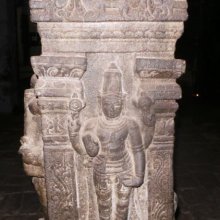Dhanteras, Dhana-terasa, Dhanaterasa: 6 definitions
Introduction:
Dhanteras means something in Hinduism, Sanskrit, Jainism, Prakrit, the history of ancient India, Marathi. If you want to know the exact meaning, history, etymology or English translation of this term then check out the descriptions on this page. Add your comment or reference to a book if you want to contribute to this summary article.
Images (photo gallery)
In Hinduism
General definition (in Hinduism)
Source: Google Books: The Satsaṅgijvanam by ŚatānandaDhanaterasa (धनतेरस) is the day for cleaning Śrī-Kṛṣṇa’s ornaments (kṛṣṇabhūṣāmṛjā), according to the Satsangijvanam (Satsangi Jeevan) by Shatananda.
In Jainism
General definition (in Jainism)
Source: Google Books: Cultural and Religious Heritage of India: JainismDhanaterasa (धनतेरस) (or Dhanteras) refers to the first day of the Divālī festival: the day on which Mahāvīra passed to mokṣa, when all the eighteen confederate kings made an illumination [...].—On the first day (dhanaterasa) the Śvetāmbara women polish their jewellery and ornaments in honour of Lakṣmī, on the second (kālīcaudaśa) they propitiate evil spirits by placing sweetmeats at cross-roads, and on the third (amāsa) all Jaina worship their account—books-Śāradā-pūjā.
Source: archive.org: The Jaina IconographyDhanaterasa (धनतेरस) refers to the “special day on which honour is done to the goddess of wealth”.—Cf. Lakṣmī or Śrī, commonly depicted in Jaina art and iconography.—[...] The worship of Lakṣmī has a great hold upon the orthodox Jainas of both communities. The special day on which honour is done to the goddess of wealth is called Dhanaterasa. On the same occasion, the Śvetāmbara women polish their jewellery and ornaments in honour of Lakṣmī.

Jainism is an Indian religion of Dharma whose doctrine revolves around harmlessness (ahimsa) towards every living being. The two major branches (Digambara and Svetambara) of Jainism stimulate self-control (or, shramana, ‘self-reliance’) and spiritual development through a path of peace for the soul to progess to the ultimate goal.
India history and geography
Source: Wikipedia: India HistoryDhanteras (धनतेरस, dhanaterasa), also known as Dhanatrayodashi (धनत्रयोदशी, dhanatrayodaśī), is the first day that marks the festival of Diwali in India. It is celebrated on the thirteenth lunar day of Krishna Paksha (dark fortnight) in the Hindu calendar month of Kartik. Dhanvantari, who is also worshipped on the occasion of Dhanteras, is considered the God of Ayurveda who imparted the wisdom of Ayurveda for the betterment of mankind, and to help rid it of the suffering of disease. [...] According to a popular legend, when the Devas and Asuras performed the Samudra manthan (churning of the ocean) for amrita (the divine nectar of immortality), Dhanvantari (the physician of the Gods and an incarnation of Vishnu) emerged carrying a jar of the elixir on the day of Dhanteras.
On Dhanteras, homes that have not yet been cleaned in preparation for Diwali are thoroughly cleansed and whitewashed, and Lord Dhanvantari, the god of health and ayurveda, is worshiped in the evening. The main entrance are decorated with colorful lanterns, holiday lights and traditional motifs of Rangoli designs are made to welcome the Goddess of Wealth and Prosperity. To indicate her long-awaited arrival, small footprint's are drawn with rice flour and vermilion powder all over the houses. On the night of Dhanteras, diyas (lamps) are ritually kept burning all through the nights in honor of Lakshmi and Dhanvantari.
Source: Hindu Scriptures: Ved Vani - November 2013Dhanteras is the name of a festival celebrated on the first day of Dipawali (Diwali or Divali).—The first day is celebrated as Dhanteras otherwise known as Dhanatrayodashi—This festival is also known as Dhanaterasa. ‘Dhana’ in the title is ‘wealth’ and ‘trayodashi’ or ‘terasa’ means ‘the 13th day’. It is celebrated on the 13th day of the second half of the Ashwin month. On this day, a lamp is lit in the evening and people worship gold, wealth, jewelry along with the deities symbolic of bestowing wealth and prosperity in life. Hence Lakshmi, Vishnu and Kubera are worshipped on this day. This day is also regarded as the Jayanti (Birth Anniversary) of God Dhanvantari. He is the Physician of Gods who came out during Samudramanthan, the churning of the great ocean by the Gods and the demons. Hence the day is also known as Dhanvantariterasa.

The history of India traces the identification of countries, villages, towns and other regions of India, as well as mythology, zoology, royal dynasties, rulers, tribes, local festivities and traditions and regional languages. Ancient India enjoyed religious freedom and encourages the path of Dharma, a concept common to Buddhism, Hinduism, and Jainism.
Languages of India and abroad
Marathi-English dictionary
Source: DDSA: The Aryabhusan school dictionary, Marathi-Englishdhanatērasa (धनतेरस).—f or pro. dhanatērasa The thir- teenth day of the waning moon in aśrvina. On this day shroffs &c. wor- ship money.
Marathi is an Indo-European language having over 70 million native speakers people in (predominantly) Maharashtra India. Marathi, like many other Indo-Aryan languages, evolved from early forms of Prakrit, which itself is a subset of Sanskrit, one of the most ancient languages of the world.
See also (Relevant definitions)
Partial matches: Terasa, Dhana, Tana.
Full-text: Dhanatrayodashi, Amasa, Kalicaudasha, Divali, Lakshmi, Shri.
Relevant text
No search results for Dhanteras, Dhana-tērasa, Dhanatērasa, Dhana-terasa, Dhanaterasa; (plurals include: Dhanterases, tērasas, Dhanatērasas, terasas, Dhanaterasas) in any book or story.
